
Publisher:
Bonnie King
CONTACT:
Newsroom@Salem-news.com
Advertising:
Adsales@Salem-news.com

~Truth~
~Justice~
~Peace~
TJP
Oct-14-2010 02:57

 TweetFollow @OregonNews
TweetFollow @OregonNews
An Indigenous Solution for Peace in Afghanistan Part 2
Khalil Nouri Salem-News.comPart two in a special series; Tribal imbalance, violence, corruption and chaos.
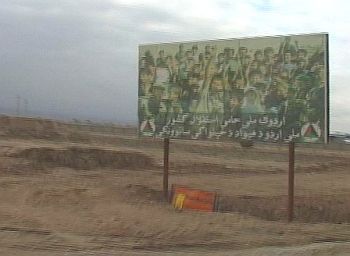 2007 Afghanistan photo by Tim King |
(SEATTLE) - This series begins with: Restoring the Tribal Balance: an Indigenous Solution for Peace in Afghanistan by Khalil Nouri Salem-News.com
The nexus between tribal imbalance and America’s incoherent military and political strategies are the root causes of the dilemma in Afghanistan, and now America’s policies are exacerbating already-deteriorating conditions on the ground.
General David Petraeus’s COIN strategy is designed for failure because of the stratospheric odds against winning Afghan hearts and minds. Not to mention the fact that NATO’s very presence is fueling the insurgency.
Also, Afghanistan, with its tribal society and weak tradition of loyalty to the state, is not a promising place for a classic counterinsurgency operation. Its twin goals of protecting the population and guiding the Afghan security forces toward self-sufficiency are inconsistent with Afghanistan's history, culture, and society.
General David Petraeus asserted in his most recent counterinsurgency (COIN) guidance that the U.S. cannot capture or kill its way to victory. The General said the decisive terrain was the human terrain and the Afghan people are the “center of gravity”. 3
He also wrote:
 Symbol of the Taliban |
The Taliban are not the only enemy of the people. The people are also threatened by inadequate governance, corruption, and abuse of power – recruiters for the Taliban.
However, U.S.-led forces can execute these COIN guidelines perfectly and would still fail to win over the local populace because Afghans perceive their sitting government in Kabul as illegitimate and corrupt.
Poverty-stricken Afghans watch as billions of dollars worth of foreign aid is poured into a corrupt patronage system and allocated to provincial leaders who act as mob bosses.
This combination of economic desperation and wanton graft is a formula the Taliban have exploited time and again. Afghan society functioned much more effectively and equitably when it had a loose decentralized form, as opposed to centralization which breeds corruption on a daily basis.
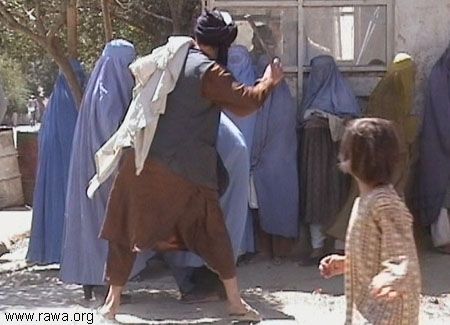
A recent Pentagon study concluded only 24% of the most critical districts in Afghanistan support the Karzai government and the rest are sympathetic to the insurgency. Respondents cited rampant corruption and ineffective governance as reasons for their opposition, and many see Karzai as an illegitimate President because they believe the most recent elections were rife with fraud.
3 isaf.nato.int/the-afghan-hands-blog/commanders-blog/comisaf-guidance-01-aug-2010.html
Government corruption is so pervasive that large percentages of Afghans in key districts are willing to suffer through another era of Taliban fascism if the only other alternative is continuing to live under the Karzai regime’s reprobate and mob-like rule. The ultra-centralization that the Americans afforded to be written into the Afghan constitution has been almost as tragic a mistake as propping up Karzai as the leader. The consolidation of power and money among the Karzai family has been mind-numbing.
The President’s brother, Ahmed Wali Karzai (AWK), sits at the head of Kandahar’s provincial council but runs the region like a kingpin – and is notorious for being involved with security extortion rings, illegal real estate deals and the drug trade.
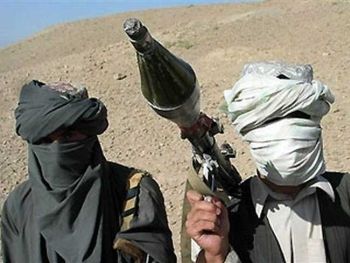
The U.S. had previously stated that the Kandahar operation will determine the outcome of the war, but if Afghans see coalition forces tied to the President’s brother, the U.S. chances of success are slim, if not nil. Maj. Gen. Michael T. Flynn, the senior American military intelligence official in Afghanistan spelled it out succinctly in the New York Times last year: 4
If we are going to conduct a population-centric strategy in Afghanistan, and we are perceived as backing thugs, then we are just undermining ourselves.
NWSC tribal connections in Kandahar have validated all of the aforementioned sentiments and claim AWK is single-handedly fueling the insurgency. Meanwhile, President Karzai claims he will not remove his brother because AWK had been “elected by the people”. However, the NWSC has first-hand knowledge from tribal leaders that AWK won the council position as the result of a local jirga, where representatives vote by raising their hands for all to see. They assert AWK used threats and intimidation beforehand to ensure he won the seat. The tribal leaders assert that AWK would be lucky to get one vote in an honest election, but anyone who valued their life would never dare to vote against him in an open jirga.
The bottom line is that the chief source of “inadequate governance, corruption, and abuse of power” is President Karzai, his family and his inner-circle. If it is true, as French army officer and counterinsurgency theorist Roger Trinquier put it, that “the sine qua non of victory in modern warfare is the unconditional support of a population”, and if the U.S. wholeheartedly believes in the most basic precepts of COIN strategy – then Karzai’s very existence as head of state is irreconcilable with capturing the hearts and minds of the Afghan population. Thus, unless something changes at the top, it would be reasonable to conclude that this war is now unwinnable. Hence, it would seem, Afghanistan is stuck with Karzai at the helm for quite some time, as he wins terms indefinitely because of his organization’s impressive electoral fraud operations. Not only that, but it appears the Karzai regime has consolidated even more power by rigging the recent parliamentary elections to ensure that the lower house is fully under the control of a soon to be unchecked executive branch, thus transforming Afghanistan into a de facto totalitarian state.
4 http://www.nytimes.com/2009/10/28/world/asia/28intel.html
Although it may seem like an affront to our Jeffersonian sensibilities, tribal instruments such as the jirga and the Afghan predilection towards a constitutional monarchy have proven to be considerably more representative than the current Afghan government's idea of self-determination.
INSURGENCY
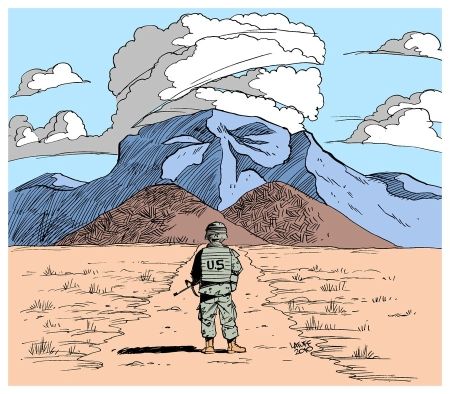 Artwork by the amazing Carlos Latuff, friend of Salem-News.com |
The issue of the Afghan insurgency is complex and subject to numerous interpretations.
Despite initial claims that the Taliban were an indigenous force and wanted nothing more than to purge Afghanistan of hated warlords and criminals, a plethora of Western intelligence as well as public statements by Afghan and Pakistani officials indicates the Taliban are closely aligned to a fatal mix of transnational extremists backed by elements of Pakistan’s military that are bent on a political and religious transformation of the region.
In a society in which people from different provinces view one another as “foreigners” one can only imagine the sentiments and mixed loyalties that have shaken the Afghan’s historical sense of pride in their nationality.
As distrust and unhappiness with the U.S.-led coalition’s efforts grows, the need for a drawdown of Western forces becomes apparent.
Yet, simply abandoning the field to the Taliban would create dire consequences that make the present military occupation look good by comparison.
What the Taliban could never have done for themselves, the coalition has provided by alienating the Pashtun tribes and virtually forcing them into the hands of Taliban “protectors” who have successfully cast themselves as a force for Pashtun nationalism.
Plus, there is definitive proof that despite the increase in troops and funds, the Taliban insurgency has grown over the past nine years and overall conditions have deteriorated. A situation succinctly summarized by the Afghanistan Study Group in their recent report3.
A New Way Forward
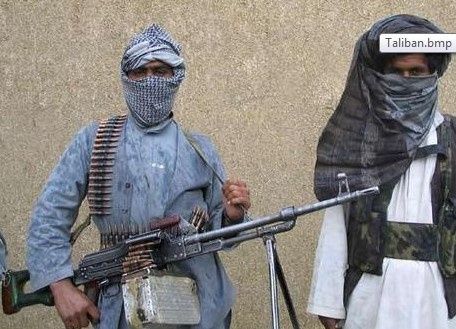
At almost nine years, the U.S. war in Afghanistan is the longest in our history, surpassing even the Vietnam War, and it will shortly surpass the Soviet Union’s own extended military campaign there. With the surge, it will cost the U.S. taxpayers nearly $100 billion per year, a sum roughly seven times larger than Afghanistan’s annual gross national product (GNP) of $14 billion and greater than the total annual cost of the new U.S. health insurance program. Thousands of American and allied personnel have been killed or gravely wounded.
3 http://www.afghanistanstudygroup.org/
And now, because of the decimation of the tribal structure, instead of respected and unifying tribal elders working with residents to build consensus and make decisions for the greater good, the chaos in a war zone has tilted the center of gravity towards “strongmen”, because in a Hobbesian world of “kill or be killed” might trumps tribal tradition and custom.
The chaos has caused a power vacuum in key leadership positions in tribes, districts and provinces that are being filled by warlords, drug traffickers, and corrupt politicians. The tribal code, weakened by the rise of the warlords, has been replaced with a code based on brute force. As Brigadier Justin Kelly put it:
“Unless you are confident in the ability of your government to enforce its peace, then the man with a gun at your door at midnight is your master.” 6
Tribal leaders have been marginalized and the tribal structure weakened, which has smothered the voice of Afghanistan’s version of the “Silent Majority”, because most Afghans are moral and well-intentioned. But the war has empowered the maligned actors whose sources of power are money and guns.
However, with all that said the great paradox is that though U.S. military strategy is currently making things worse, they cannot leave – at least not until a political solution is put in place that can empower the people and allow them to take back their country.
6 http://www.quadrant.org.au/magazine/issue/2009/4/how-to-win-in-afghanistan
NO-WIN SOLUTIONS
Mr. Obama needs an exit strategy, but the options he’s been provided and other supposed solutions that one reads in op eds across the blogosphere are no-win proposals that will fail to meet U.S. objectives and only make matters worse in Afghanistan.
If the root cause of the current dilemma is tribal imbalance, the obvious answer should be to reinstate this equilibrium – one would think. However, a number of Western foreign policy experts have posited interesting remedies that would do the exact opposite. The status quo counterinsurgency is obviously not the approach, but neither is simply handing the country back to the same set of warlords that caused this mess in the first place. Nor would dividing Afghanistan into partitions be the answer, because it would simply make the state inherently prone to civil war.
IMMEDIATE WITHDRAWAL
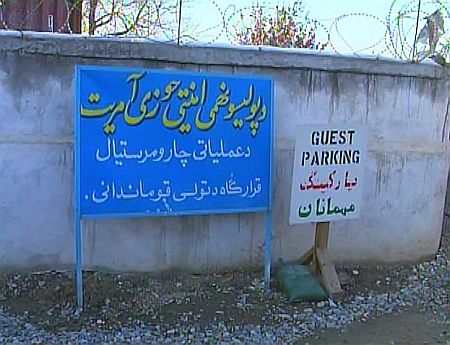 Afghan Police Station. Photo by Tim King Salem-News.com |
Bereft of a political solution, it is not speculation but a guarantee that if U.S. forces drawdown prematurely, the government in Kabul will collapse and a more divisive and destabilizing civil war shall erupt. The Afghan National Army (ANA) and Afghan National Police (ANP) are just one of the major problems - they are symbols of the central government and not trusted by a society built on localized security. Yet, the U.S. continues to stake their mission on developing these security forces. Without a unifier, after the U.S. withdraws all of this training will become academic when these forces collapse or reunite with the Tajiks, Uzbeks and Hazaras of the former Northern Alliance to fight the Pashtun uprising.
Besides not sufficiently reflecting the Pashtun population – the country’s largest ethnic group – Afghan national security forces are loaded with drug addicts and criminals due to low pay and the fact that real warriors and fighters are either still defending their tribes or have joined the Taliban, typically for more money.
Once again, ignoring the norms of a decentralized and fragmented society, the U.S.-led coalition tried to force a top-down approach to build a national security force.
Instead, they should have focused on strengthening and arming the villages and building a security structure from the ground-up. An immediate U.S. withdrawal could be disastrous before the political solution is in place, because we have seen what happens in Afghanistan when there is a power vacuum at the top – violent “strongmen” men like the Taliban and warlords seize power.
POWER-SHARING AND RECONCILIATION
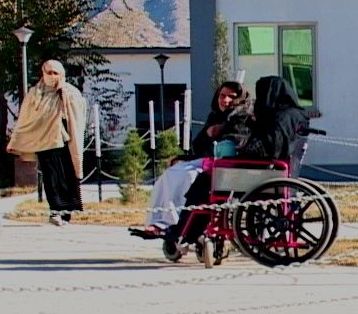 These women were both crippled in Taliban attacks. |
The Obama administration is reportedly attempting to negotiate a power-sharing arrangement with the likes of Mullah Omar’s Taliban, the Haqqani Network and Gulbuddin Hekmatyar’s Hezb-e Islami, with dubious usual-suspect go-betweens involved such as the Saudis and Pakistanis. The Afghan people have seen this movie before, and it doesn’t end very well. Read the tribal elders’ lips: the solution must be an Afghan solution – they do not want Pakistani or Saudi Arabian involvement whatsoever.
After the initial takedown of the Taliban after 9/11, the U.S. unabashedly handed the physical security of the country over to warlords, the consequences of which need not be belabored.
And now U.S. officials are thinking of brokering a deal to share the Afghan nation with an even more malevolent cast? As far as reconciliation with the Taliban-led insurgents go, care must be taken because, as Sima Wali, King Zahir Shah’s representative to the Bonn Conference once quipped:
“You show me a moderate Talib and I will show you a moderate Nazi.”
There is a difference between allowing disenfranchised Taliban fighters to rejoin Afghan society but an entirely different matter to allow the movement’s leaders to share power.
Some within DOD intelligence have suggested that Hekmatyar falls within the “reconcilable” category – which may or may not be true. However, it is likely irrelevant because our sources in Afghanistan have lent the impression that the tribes do not want to negotiate with Hekmatyar and would rather see him prosecuted, exiled to Pakistan forever – or worse. Ultimately, the U.S. must leave it up to the Afghans. The Afghans should decide which Taliban will be reintegrated into the villages and the Afghan people will determine what role Taliban leaders will have in the new government.

PARTITION
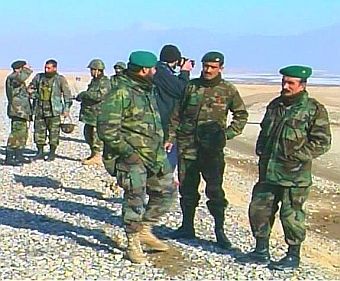 Attesting to the diversity of the Afghan military, this |
A few Western foreign policy experts have recklessly suggested partitioning Afghanistan, including former Bush administration official Robert Blackwill, based on the premise that since the US cannot win the current war in Afghanistan it should consider a de facto partition of the country and hand over the Pashtun south to the Taliban while propping up the north and west where Uzbeks, Tajiks and Hazaras live.
However, countries such as Russia, Tajikistan, Iran and Pakistan have at one time or another over the past 20 years proposed similar plans - all to no avail. The Afghan response to such talk - regardless of region, ethnicity or tribe - has been swift and at times even threatening.
According to Pakistani journalist Ahmed Rashid:
Twenty years ago, Gen Dostum told me that the first Afghan who suggests partition would have his throat slit. Before the attacks of September 11 2001, Taliban leaders told me the same thing. The same holds true today.
http://www.ft.com/cms/s/0/7caa5128-94f3-11df-af3b-00144feab49a.html
Afghanistan’s ethnic mix is much more complex than Westerners realize and such a partition could have worse consequences than India’s ill-conceived division that gave birth to Pakistan in 1947, considering a number of Pashtuns live in the north as quite a few Uzbeks and Tajiks live in the south. It is a recipe for perpetual civil war.
AN AFGHAN SOLUTION
BROAD SUPPORT
40 years of difference show in these photos of Afghan bicycle |
HOWEVER, all is not lost. But the indigenous solution will require quite the paradigm shift for most Westerners who will struggle with the concept that Afghanistan’s future lies within its past. It is a historical and undeniable truth that Afghanistan saw a 40-year epoch of peace when there was tribal balance, lineal rule, and society was based on indigenous tradition and custom. And it is very clear what happened when this tribal balance was decimated. Hence, a logical conclusion would be that a restoration of said balance and a return to a truly indigenous form of government is required. The NWSC has designed a peace process that has garnered broad support to achieve such a solution.
What Americans and Westerners must trust is that the majority of Afghans are good people but have been victimized by history and their society devitalized under the repressive control of the minority of warlords and strongmen who have seized and consolidated power. An Afghan solution, however, will empower these people to come forward and take back their country from the oppressors.
At a recent gathering of the Afghan community in the Seattle area, the NWSC received unanimous support from a diverse subset that represented Afghan society, who all advocated for a series of “All-Afghan Jirgas” to solve the political dilemma in their homeland.
This idea has been discussed directly with contacts in Afghanistan along with members of the Afghan Diaspora, located in America, Canada and Europe – who all roundly support the concept. This includes influential tribal leaders from the most popular tribes in the South such as the Alokozai and Achakazi; some Ghelzai Pashtuns in the East; and non-Pashtun tribes across the country - including the Hazara, Uzbek, Tajik and Panjshirees in the North. It has even been approved by former Taliban commanders, former members of Hezbi-Islami and retired Pakistani military and intelligence officials.
For anyone that knows anything about the nature of Afghan tribalism and custom - if the aforementioned types of people approve of this idea, then it is beyond all doubt that the entire Afghan nation will accept the plan as well.
THE ALL-AFGHAN JIRGA
The Loya Jirga is a “grand assembly” of Afghan leaders and tribal elders typically convened to decide a major political matter such as selecting a new head of state or ratifying a constitution. It is a tool that has been used since the 1700s, especially in times of crisis, including the one assembled in Kandahar in 1747 when Ahmad Shah Durrani was appointed the first Emir of the modern Afghan state.
The jirga is actually one of the oldest forms of democracy and will be an ideal tool for selecting Afghan’s next government that should meet Western standards of representative sovereignty. The jirga is a functioning decision-making body, mythic and sacred in nature, which is steeped in Afghan custom and can actually lead to a strengthening of the internal cohesion of the tribes as well as promote cross-tribal consensus building. The jirga will help ensure a unifying, legitimate and representative leader is selected.
The “All-Afghan Jirgas” initiative would be organized by the NWSC and its native Afghan partner organizations. A total of three rounds of jirgas would be held, the first two of which would be held in neutral countries before the finale in Afghanistan. Below is a breakdown of the objective and location of each jirga round:
- Jirga #1 – Define the solution ( country to be determined )
- Jirga #2 – Develop the implementation plan (country to be determined)
- Jirga #3 – Choose Head of State (Kandahar)
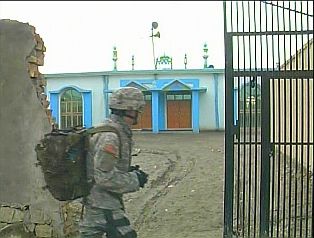 U.S. Army soldier patrols near a mosque in Kabul. |
At the first jirga the tribal elders will define the type of government they want, resolve their differences akin to tribal feud or any prior animosity towards one another, and begin the process of nominating candidates for head of state. At the second jirga the participants will decide on an implementation plan and at the final jirga the head of state and government type will be selected and announced.
The reason for the foreign locales is due to the lack of security in Afghanistan, considering the country is in the middle of a war. Previous jirgas held in places like Kabul have been interrupted by gunfire and rocket-propelled grenades. Not to mention that over a dozen people were killed in the run-up to the most recent parliamentary elections.
A jirga outcome under foreign occupation would be unacceptable to the tribes; hence Afghanistan would still be stuck with a legitimacy issue. The decisions emanating from a jirga held in a neutral country would be accepted as more legitimate because of the absence of coercive powers. If the first two jirgas are successful in other countries, it will actually enhance Afghan nationalism and win the trust and confidence of the people.
Kandahar is to host the finale because it’s mission critical to winning the war, the heart of Afghan politics and the Taliban’s spiritual cradle. Holding an event of such magnitude can rally the local Kandahari populace around the All-Afghan cause, diffuse the insurgency and bring relative calm to the entire volatile southern region. Plus, it will bless the process and the nominees with historical recognition and the respect of the people.
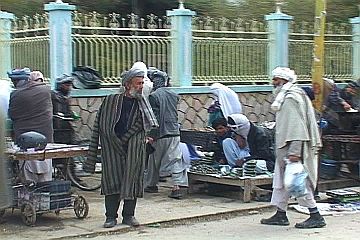 Afghan citizens in Mazur-e-Shariff, Afghanistan. |
One indispensable requirement is that there is no foreign involvement in any phase of the process. U.S. involvement will be relegated to providing “a level playing field” which will be accomplished by simply providing security where and when needed.
http://usacac.army.mil/CAC2/MilitaryReview/Archives/English/MilitaryReview_20091231_art004.pdf
The entire process could take anywhere from three to six months. The NWSC will work with other native Afghan NGOs and organizations to create an independent commission stationed in Kabul that would register those who want to attend the jirgas.
A formula would need to be devised to ensure the decision-making body contained an accurate number of delegates that was a true reflection of the proportionality of Afghanistan’s tribal and ethnic demographics.
Parties or groups will not be allowed representation – only individual Afghans. The Taliban, the Afghan government, drug barons or the warlords cannot attend.
The likes of Mr. Karzai, Mullah Mohammad Omar, Hekmatyar, Rashid Dostum and other leaders may join the jirga as ordinary Afghan citizens without any affiliation – or bodyguards.
BONN AGREEMENT: LESSONS LEARNED
The All-Afghan Jirgas concept does bear similarity to the process outlined in Bonn Germany as the post-9/11 war against the Taliban had been winding down, in which a transitional government with an interim leader had been established along with a roadmap to select a new leader and constitution. The Bonn Agreement was aimed at, purportedly, establishing a permanent “broad-based, representative and democratically-elected government”.
The concept of the Bonn Agreement was not the problem but the manner in which it was actualized. The outcomes were already predetermined by U.S. officials, arguably driven by Western geopolitical and economic interests. Motives aside, U.S. manipulation of the jirga’s results is an underreported historical fact according to M. Chris Mason who served as a U.S. political officer on the Pakistan-Afghanistan border. Mr. Mason told the NWSC that the Bonn Process was rigged by the U.S. to "put our man Karzai in office”, and he wrote the following in the U.S. Army’s own think tank magazine, The Military Review:
In 2002, three-quarters of the participants in the Emergency Loya Jirga signed a petition to make the late King, Zahir Shah, the interim head of state, an inconvenient show of reverence for the monarchy, which required an extraordinary level of covert shenanigans to subvert. Even a ceremonial monarchy would have provided the critically needed source of traditional legitimacy necessary to stabilize the new government and constitution.
It was a clear case of foreigners dictating Afghanistan’s future by blatantly ignoring the will of the Afghan people. The cast of characters that did attend were so entrenched with other foreign powers that China, Iran, Russia and other outsiders also were able to influence events. Figure 3.0 below compares the Bonn Agreement to the proposed All-Afghan Jirgas.
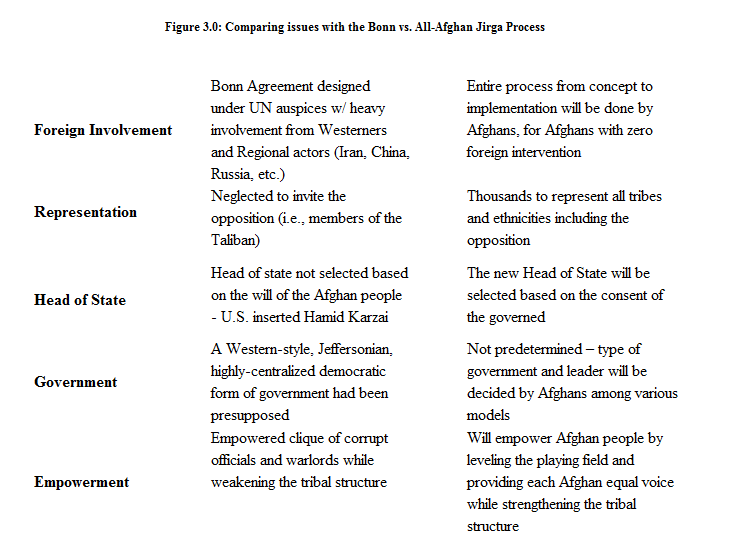
U.S. ROLE
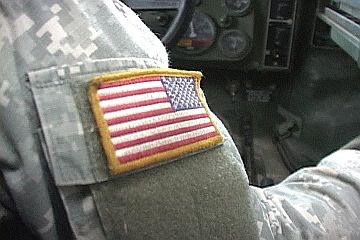 Salem-News.com photo by Tim King |
Of course, the U.S. cannot abandon Afghanistan either. They just must play a supporting role and not be seen leading the fight. The reality is, the civil war could still rage for awhile and the Afghans will need to deal with this in their own way.
However, the tribes will need U.S. support to defeat Taliban remainders who refuse to yield until a Caliphate is established. It would be a “reverse mujahideen” strategy – propping up moderate Afghan pro-government Muslims against jihadists, as opposed to fanning the growth of pan-Islamic extremism as the U.S. did in the war against the Soviets.
Afghans have a warrior code and will fight to the death to defend their tribal honor, especially against foreigners - they are self-contained fighting units that simply require funds, a little training, advisement and upgraded weaponry. Except this time the “outsider” enemy will be the Taliban.
TALIBAN REEMERGENCE
NWSC has also received word from key Pakistani leaders and even some Taliban commanders that they would find a Zahir Shah-like government in Kabul an agreeable alternative.
Some objections may be raised that the Taliban toppled Kabul in the past and will take over once again after NATO leaves. One must remember that the Taliban were able to run roughshod and takeover Afghanistan in the mid-90s because the tribal structure had been decimated and lacked cohesion, not to mention there was the absence of a unifying national leader.
Also, the Taliban had overwhelming and near explicit support from Pakistan’s army and intelligence group, led by General Beg and Hamid Gul. Pakistan provided the Taliban with funds, weapons, sanctuary, recruits, training and logistical support and even deployed Pakistani troops throughout the country. They also gave the Taliban enough cash to buy-off warlords and corrupt governors, as some provinces fell under their control without a shot being fired.
Not to mention, ironically, the Taliban carried snapshots of Zahir Shah and deceived the Afghan people by telling many of them once Kabul fell they would reinstall the King – but this never happened. This is yet another illustration of the type of respect the people held for Zahir Shah.
OTHER CONSIDERATIONS
This white paper was meant to propose a process design and requires a much more detailed project plan and entire other white papers could be written about critical issues and questions that must be considered and answered, including:
- Pakistan / Saudi Arabia: How does Afghanistan neutralize Pakistan and Saudi Arabia during the jirga proceedings and keep them out of Afghan affairs in general going forward?
- Drug Trade: The drug trade is one of the more destabilizing factors and will require an entire white paper to outline any solutions. But much of this solution must come from the U.S. and its intelligence agencies.
- Government Types: Ideally the form of government will be left up to the Afghans to decide at the All-Afghan Jirgas, however – that could also be a recipe for chaos if thousands of solutions are put on the table. A commission should come together of key Afghan leaders to determine three to five workable options for the group to choose from.
- Political Fallout: This process should not be seen as a “loss” to the U.S. government but a big “win”. It is not a rejection of Jeffersonian democracy, but a rejection of its current form. Left to their own devices, the Afghans will perhaps progress to a similar type of government.
- Security: Once the plan is announced the delegates will be in grave jeopardy and will be threatened by elements from both the insurgency and the sitting government. The U.S. will have to take care to provide this security so that the delegates will be safe until the political solution is in place.
NEXT STEPS
The next step would be for Congress, the White House and the military to buy into the concept and then fund a deeper assessment that would be accompanied by a detailed project plan. An independent commission of Afghan natives should be established, preferably led by the NWSC, which would handle things such as the logistics of the jirga; developing a delegate representation model; identifying, vetting and registering participants; coordinating the development of government options; and acting as a liaison between the delegates and the U.S. government.
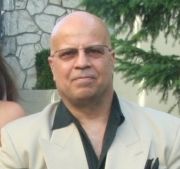 Born in an Afghan political family belonging to the Mohamadzai clan of the Pashtun Durani confederacy, Khalil's father, uncles, and cousins were all career diplomats in the Afghan government. His father's diplomatic career led to time in Moscow, Pakistan, London and Indonesia. Throughout all this time, since the 1960’s, Khalil grew to be exposed in Afghan politics and foreign policy. During the past 35 years he has been closely following the dreadful situation in Afghanistan. His years of self- contemplation of complex Afghan political strife and also his recognized tribal roots gave him the upper edge to understand the exact symptoms of the grim situation in Afghanistan.
Born in an Afghan political family belonging to the Mohamadzai clan of the Pashtun Durani confederacy, Khalil's father, uncles, and cousins were all career diplomats in the Afghan government. His father's diplomatic career led to time in Moscow, Pakistan, London and Indonesia. Throughout all this time, since the 1960’s, Khalil grew to be exposed in Afghan politics and foreign policy. During the past 35 years he has been closely following the dreadful situation in Afghanistan. His years of self- contemplation of complex Afghan political strife and also his recognized tribal roots gave him the upper edge to understand the exact symptoms of the grim situation in Afghanistan.
In addition to his role as a Salem-News.com contributor, Khalil is a guest columnist for Seattle Times, McClatchy News Tribune, Laguna Journal and a staff writer for Veterans Today. He is the cofounder of NWSC Inc. (New World Strategies Coalition Inc.) a center for Integrative-Studies and a center for Integrative-Action that consists of 24- nonmilitary solution for Afghanistan. You can write to Nouri Khalil at this address: khalil.nouri@gmail.com
Articles for October 13, 2010 | Articles for October 14, 2010 | Articles for October 15, 2010


googlec507860f6901db00.html


Salem-News.com:
Terms of Service | Privacy Policy
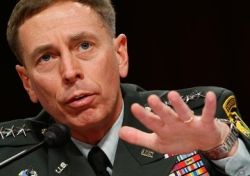
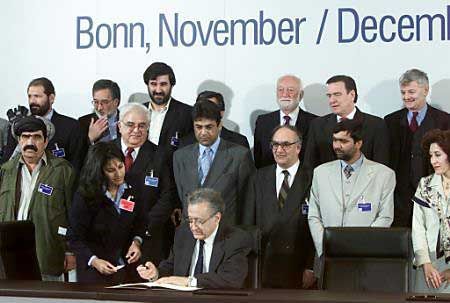
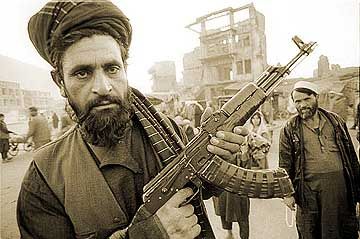
All comments and messages are approved by people and self promotional links or unacceptable comments are denied.
Douglas Benson October 14, 2010 6:34 am (Pacific time)
Good luck,our leaders are hell bent on imposing our form of goverment on the Afghan people. It wont work but we wont admit it . The UN ,WBO,and the IMF should have recognized Afghanistan a long time ago so they could rebuild thier country themselves .It would only be fair since we supported thier fight against the commies who turned thier country into a wasteland . Its interesting that we seem to have become the enforcement arm for the IMF,WBO etc. Noriega refused to use the IMF to launder drug monies and was going to keep the panama canal ,in we go ,Afghanistan in my opinion tried to hold the supply of opium hostage for recognition as a country ,in we go. The list goes on and on but the point is we shouldnt be running around the world on the backs of the american people playing policeman. Peace
[Return to Top]©2025 Salem-News.com. All opinions expressed in this article are those of the author and do not necessarily reflect those of Salem-News.com.